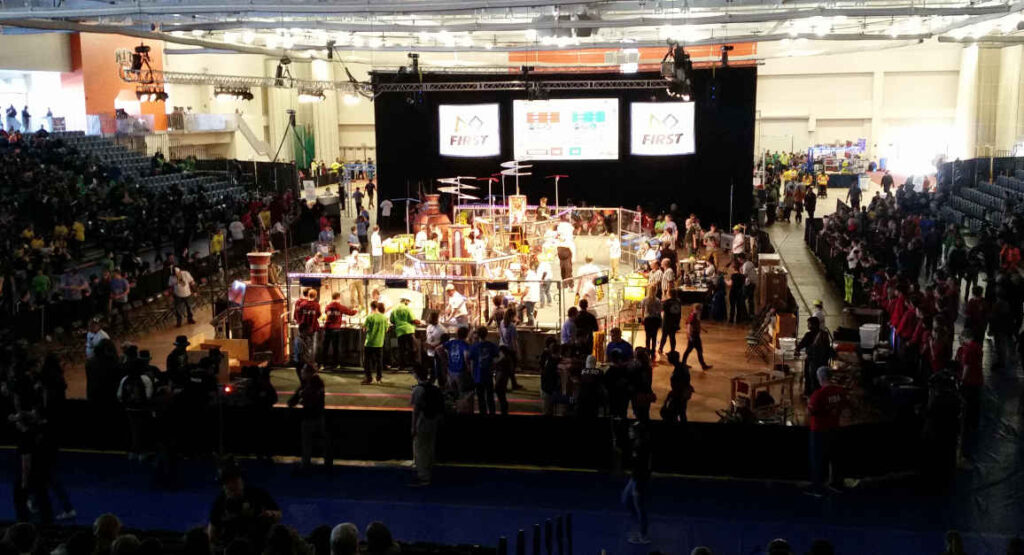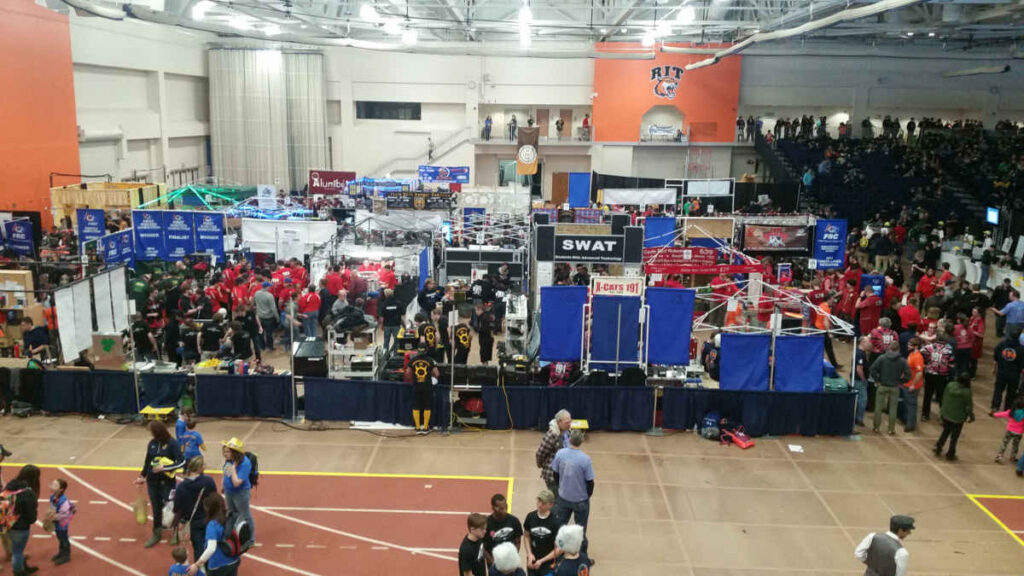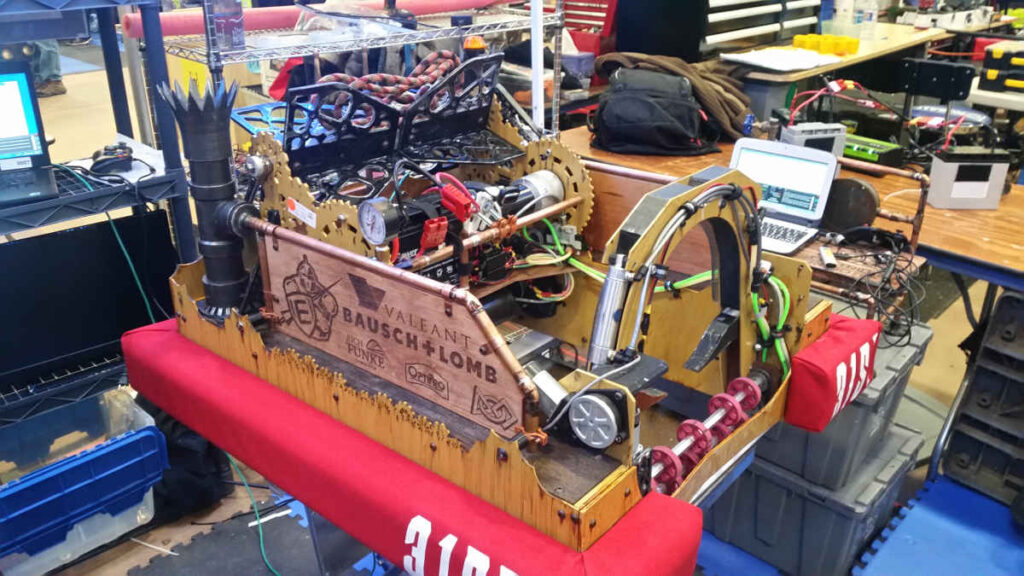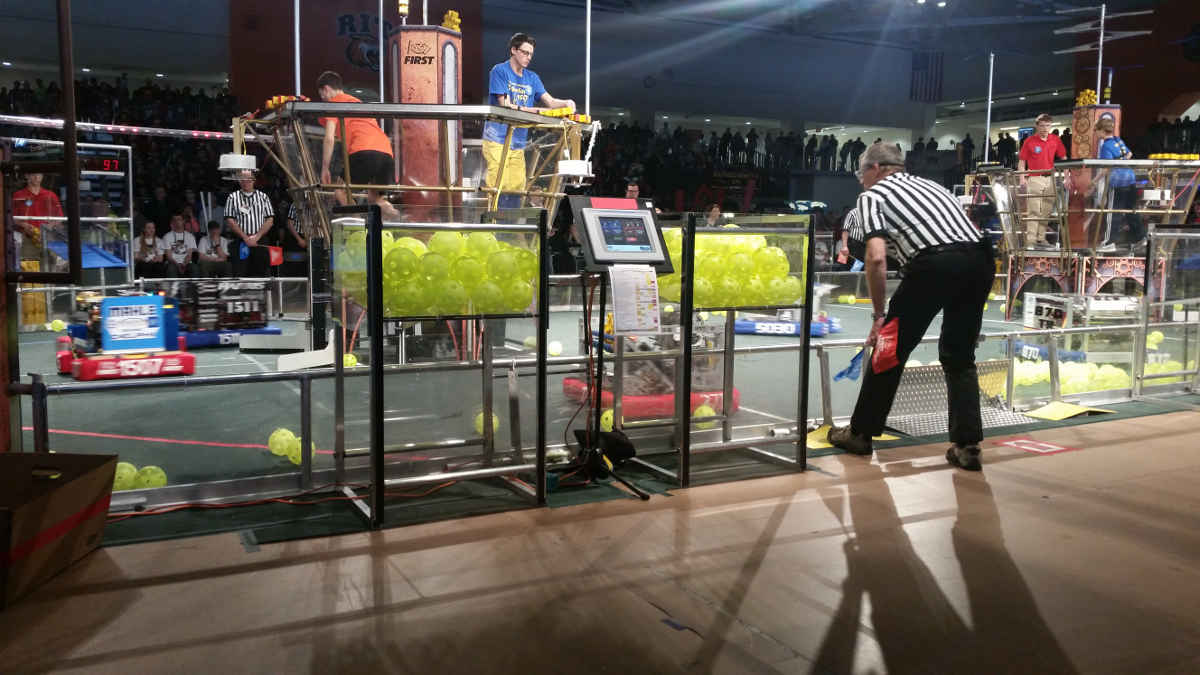
What I learned at a FIRST robotics competition
When I volunteered to judge the Finger lakes FIRST Robotics competition, I had no idea how much I was about to learn about business, and about how strongly teamwork correlates to success.
The competition involves high school students that design and build their own robots or “bots” to compete in a competition that changes every year. This year, about 49 teams competed for prizes, and the chance to move on to the Championship.
Teams competed from a wide range of school districts. From Quebec to Ohio, urban to rural, there was a wide range of teams, all competing and working together.
That’s really what made this experience so unique.
Teamwork and Success

There were a few things that set some teams apart, and those things translate directly into business. I never expected to be schooled on business and leadership at this event, I just thought it was an opportunity to have some fun working with youth.
While all players we saw were fantastic role models, it took us about 2 seconds to realize when we were talking to the strongest teams in the competition. It wasn’t what these teams said, but it was what these teams did while we were talking to them. You could just smell a strong team, and the things that they were doing correlate directly to successful business teams.
Strong teams had
- Passion
- An Incredibly Strong Work Ethic
- A Desire to Put Others First
Harnessing Passion to Drive Team Success in Engineering ProjectsPassion
The minute I spoke to the teams, I could see how much passion they had. Some teams were so excited, it was like they couldn’t get the information out fast enough about how well their team worked together. You could see it on their faces how pumped they were to be able to do this.
Think about the strongest players on your team; most likely, they’re passionate about what they do. It’s not merely an interest, and it’s not a 9-5 to them. These are the people that don’t need to be told what to do. They understand the mission for the team, they understand their role and how it relates, and they have a fire inside them driving them win.
Work Ethic
Walking around the pits, you could tell that teams were working hard, but like an iceberg floating in the ocean, you’re only seeing a small portion of the work.
These students had 6 weeks to design and build their bots. They’re not just little RC cars either, they have autonomous modes, complicated machinery, and programs written in languages varying from LabView to Python and Java. To do all of this, and have a winning bot, it takes an incredible amount of dedication and work.
Their work went beyond robotics too. Some teams are actively working with state government officials to promote STEM education. Others are working on starting other teams locally, and abroad in places like Ghana, and that’s just the highlight reel. Many teams have done work in their own communities from helping clean up after a serious storm, to writing inspirational messages on the sidewalks in their town.
Think again about your teammates. Some call this hunger. How hungry are you? Do you scratch and claw at every opportunity? Do you work tirelessly to make your customers happy? The best team players and best businesses have a strong work ethic. You can’t force a work ethic. Nobody was making these students show up to build the bot. They did this because of that fire inside of them. It’s an internal force that drives people to succeed.
Putting Others First
We saw that the strongest teams were also givers, not takers.
There was one team that was having some serious issues with their robot, and they were at a loss. The robot simply wouldn’t work. Word got out that a team was in trouble, and like a rag-tag NASCAR pit crew, teams from all over descended on the struggling team’s pit to help. The teams that helped didn’t just fix their robot, they taught the struggling team how to fix their robot. Many people spent hours with this team. That was time that they donated that could have been spent making their robots better faster and stronger, but they saw a need and filled it, and that’s just one example.
The teams that were winning looked happy to work together, like a family of best friends. Talking with people in the interview process, we saw that stronger teams constantly had players that pointed to their teammates as a reason for their success. We kept hearing things like “Mary is our programming genius” or “Bobby did an awesome job marketing”. The best teams lifted each other up.
Think once more about your team. Do you have coworkers that put others first? When it’s done well, it’s hardly noticeable, and it seems completely natural. It’s more obvious when people don’t put others first. People that take credit for team accomplishments, or people that blame others for problems are the opposite of putting others first. When you have someone that puts others before themselves, it makes the whole team stronger.
I need to mention that these people still thought highly of themselves. They simply were eager to show off their teams. C.S. Lewis once said “True humility is not thinking less of yourself; it is thinking of yourself less.” This certainly rings true with strong teams.
Bringing It All Together

By seeing how these teams worked together, then witnessing them in competition, I had the incredible opportunity to see the impact that a strong team has on success. It really opened my eyes to the parallels between strong teams and strong business teams. I am incredibly thankful for this opportunity, and I’m already looking forward to next year. If you’re interested in volunteering, visit the FIRST volunteering page.

